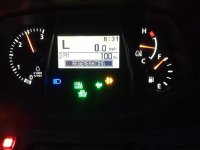The regen cycle depends on the tractor. On my Kubota, the soot is collected in a ceramic filter that works just like an air or oil filter except that it is not disposable. I can set the computer readout on my dash to read percentage of filter use. When it reaches 100% and if I have my tractor in automatic mode, I will only know the regeneration is in process by a flashing yellow light saying it is regenerating. No difference in power (although a slight power drop can be detected on a dynamometer) and it takes about 15 minutes. If for some reason I need to stop working during a regen (change boxes when I am chopping hay for instance), the computer will keep the tractor from throttling down to low idle (it holds about 1600 rpm). Once the regen is complete the yellow light stops flashing and the display shows the DPF 0% filled with soot. I don't notice any loss of power as the DPF fills. I still chop more haylage per hour and per gallon of diesel than my brother-in-law. We always operate in the same field, same model chopper, but he has on older Tier1 tractor while I have a Tier4 interim. The filter burns out the diesel particulates virtually completely but engine oil does leave an ash after regeneration. This is why Tier 4 engines require CJ-4 oils - they are formulated for reduced ash. My book maintenance is have the DPF cleaned every 3,000 hours. The local shop that cleans filters will do my size filter with normal ash content for about $200. Of course if something fouls the DPF like running a lower spec oil the cleaning cost will be higher. Kubota says my tractor will go 13 hours between regen cycles at 109% power but mine have varied from 18 hours to 35 hours. That indicates I am not working it to their max duty cycle. From what I read here the smaller tractors must use a less capable system. I have neighbors with an
M7060, a M135GX like mine, and a
M100GX. Two have over 1,500 hours, one is at 400 hours, and the smallest one is at 150 hours. None have had any regen problems although all of us have at least one time forgotten to press the auto button prior to at least one regen but noticed the flashing yellow light telling us a regen was needed, pressed the auto button, and went about our work. The one neighbor who got a New Holland and was worried about Tier 4 says the same thing. He has a larger operation and hires ex-mine heavy equipment operators for drivers (we are in iron mining country). They fight over who gets to run the new tractor. When they fill with diesel they top off with DEF while the fuel tank is filling. I had planned to ditch my
L5740 for a
L6060 at the end of winter simply to get the Tier 4 final engine but Kubota dropped their zero for 60 program in favor of zero for 48 and my wife is pushing got a pickup replacement this year. You all now also have me worried that the system of the L's might not be as good as that of the larger M's so it may be wise to hold off another year and get more input.
